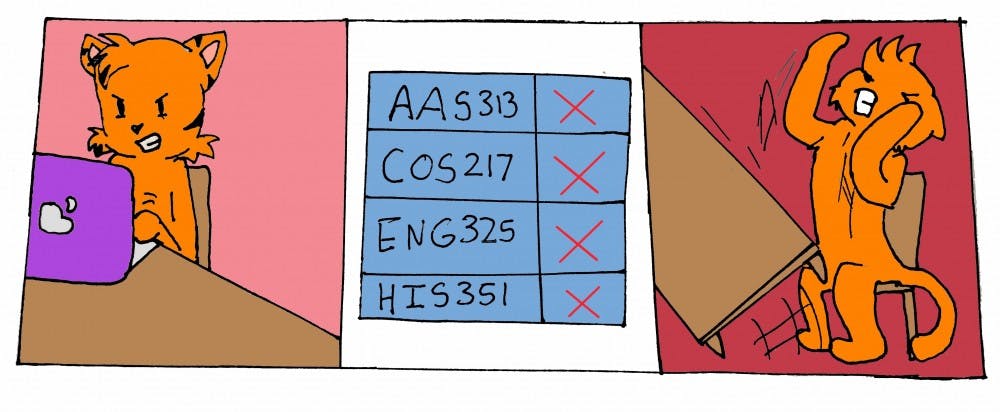We are rapidly approaching the middle of the spring semester after what feels like a very short January and February. The past few weeks have flown by, and once again, we are facing midterms. For some first-years, classes this semester will define the track they will take in their studies during the remainder of their years here. So, what do you do if you find yourself doing worse than imagined in classes for what you once thought was your major? Are the results you’re receiving now an opportunity to explore other areas of interest? Now is the best time to ask yourself whether this is a good time to genuinely reevaluate your future rather than jumping to conclusions that you have no chance at succeeding in the current areas you are in.
As someone who excelled at STEM-related courses in high school, I felt confident in my abilities as a STEM student when coming into Princeton. I could even say I was excited. But after the first half of my Chemistry 201 semester, I started second guessing my abilities as a scientist. Having entered Princeton thinking I wanted to be a molecular biology major, I felt defeated after receiving low grades in the class and began to wonder if it would be worth continuing as a pure science major, especially when I was enjoying my other non-STEM classes
While facing challenges in the realm of study you want to pursue can be discouraging, those challenges are actually necessary in helping you to evaluate just how serious you are about your intended area of study. I’ve come to realize that if you’re not willing to put in the effort and directly address the areas you are struggling in, you probably shouldn’t be pursuing the path you started on. Obviously, it can be difficult to both recognize and accept when to make the decision to change your trajectory. Thus, I want to present a couple of thoughts to consider when feeling unsure about where you’re going and what you should be doing to achieve maximum success, both in school and when thinking about a future outside of Princeton.
One of the most important aspects of Princeton to understand is that many of the “Introduction to” classes work as weed-out classes to narrow down the pool of departmental majors and focus on solidifying the passion and discipline in students who truly want to continue in those areas. Thus, rather than immediately becoming discouraged by feeling challenged or confused in such classes, remember that they are meant to be difficult.
A low grade in a class like CHM 201 or PHY 103 is not the end of the world, nor is it a sign that you should be seriously considering a change in concentration. Especially for first-years, those classes are not representative of your ability to be successful and do not reflect whether you will fit into a particular department. However, if you feel like you would not be willing to put in the effort in future years or that there is nothing to look forward to in upcoming semesters for your major, it might be a good idea to think about other areas of academia that you are interested in.
With that said, recognize that changing your plans — if you decide to do so — is not out of the ordinary. The purpose of a liberal arts education is to create well-rounded students who have had the chance to explore a variety of disciplines. Thus, it is only natural that you may feel a pull every so often to classes that are completely opposite to ones you may have excelled in prior to college. If you come to the conclusion that one of those other areas of interest would better suit your attention, take the opportunity of the flexibility within the Princeton curriculum to take classes in that subject and test the waters. Worst comes to worst, you’ve gained more knowledge in an area where you may previously have had none.
I am a strong believer in not allowing a midterm grade to determine your fate as a student. The overall experience in a class and the level of comfort and willingness to try should be what motivates your engagement with the material. However, there also comes a point where each student must decide what is important to them, whether that is a high GPA, passion for what they are learning, security in job prospects for after college, or a little of everything. In that case, it becomes necessary to evaluate your priorities and to have the conversation of whether to stay where you are academically.
Even though I had a rough first semester in chemistry and was tempted to start looking at other possible concentration paths, I’ve found that I needed that first semester adjustment period to reset my point of reference for success and what would be required of me to meet my goals. My classes are still challenging, but I recognize that I am passionate enough about the department and the subject to stay where I am, regardless of the long nights where I question if it will all be worth it in the end. Don’t worry if you’re not feeling the same way this spring. Princeton has many amazing options to explore, and what is college for if not experimenting?

Brigitte Harbers is a first-year from New York, N.Y. She can be reached at bharbers@princeton.edu.









